Escalating violence in Ecuador has forced the military to declare war on gangs, after years of rampant drug crime in the South American country.
Ecuadorian President Daniel Noboa declared on January 10 that the country was at war with drug gangs. A day earlier, he had designated 22 gangs with a total of about 20,000 members as terrorist organizations, making them legitimate military targets for the army.
"We are at war and cannot give in to these terrorist organizations," he stressed in a speech on Canela Radio.
After drug lord Adolfo Macias escaped from prison in the port city of Guayaquil on January 8, President Noboa declared a nationwide state of emergency and imposed a nightly curfew for 60 days. In the two days following his declaration of war, the Ecuadorian military cracked down and arrested more than 300 members of major gangs such as Los Choneros, Los Lobos and Los Tiguerones across the country.
The arrival of the Ecuadorian military did not scare off criminal organizations, but instead made them more aggressive with a series of prison riots, taking more than 130 prison guards and civil servants hostage. Gunmen raided the Ecuadorian TV station TC, taking 13 hostages in the studio on live air, before being suppressed by armed police.
Images circulating on social media show heavily armed gangs walking through the streets of Ecuador. Some videos show criminals carrying rocket-propelled grenades, or police officers shooting and chasing gang members through the streets.
Ecuadorian special forces rescue hostages at a TC TV station from gunmen from the Los Choneros drug gang on January 9. Video: X/ShaykhSulaiman
Ecuador was considered an "oasis of peace" in South America during the period 2007-2017, when former leftist president Rafael Correa agreed to negotiate with gangs. He opened a path to "rehabilitation" for them, willing to pour in subsidies on the condition that gangs register as local cultural organizations and end all violent activities.
Correa created a Justice Ministry, invested in local policing, and increased funding for security and anti-crime programs. The government made it easier for young gang members to find jobs and reduce prosecution.
Ecuador's murder rate dropped from 15 per 100,000 inhabitants in 2011 to 5 per 100,000 inhabitants in 2017, much lower than that of neighboring countries.
Industrial-scale drug production networks do not exist in Ecuador, as they do in neighboring Colombia and Peru, nor does the country face sustained challenges from paramilitary political movements or armed separatist groups.
Gangs in Mexico and Albania have joined forces with Ecuadorian criminals, determined to turn the region into a "highway" for transporting drugs to North American and European markets.
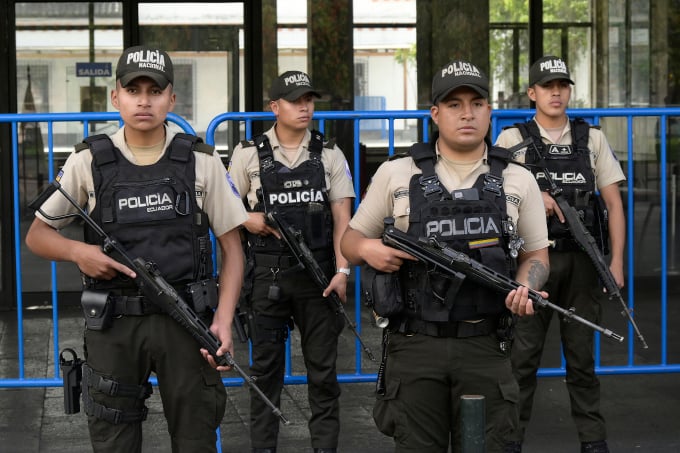
Armed police stand guard outside Quito City Hall, Ecuador's capital, January 10. Photo: AFP
However, the security situation in Ecuador has deteriorated since Correa's tenure, especially since the government of neighboring Colombia signed a peace agreement in 2016 with the Revolutionary Armed Forces of Colombia (Farc). Researchers say this was a turning point in the escalation of gang violence in Ecuador.
Much of the drug-smuggling route from southern Colombia to Ecuadorian ports was once controlled by the Farc. After the separatist movement agreed to disband in a peace deal with the Colombian government, powerful Mexican drug cartels quickly stepped in, offering money and weapons to lure Ecuadorian criminal groups into creating new smuggling corridors.
According to the United Nations' 2023 Global Drug Report, the two Mexican cartels behind the fight for dominance of Ecuador's underworld are Sinaloa and Jalisco Nueva Generacion, which control much of the drug smuggling routes from Mexico to the United States and are hungry for supplies from South America.
Guayaquil, a city of 2.2 million people and Ecuador’s economic hub, has become a hotbed of drug trafficking in recent years. Gangs are vying for control of the city’s port system, which they use as a springboard for shipping drugs by sea. Colonel Maro Pazmino, the former head of Ecuador’s military intelligence, warned in 2019 that the country had become a transit point for 40% of the drugs produced in Colombia.
Gang-related violence killed more than 8,000 people in 2023, double the 4,500 in 2022, according to Ecuadorian government statistics.
Ecuador’s prison system is overcrowded and beyond the control of police. Some prisons have become crime fiefdoms. Riots have become more frequent in recent years, with gangs battling for influence leaving hundreds dead.
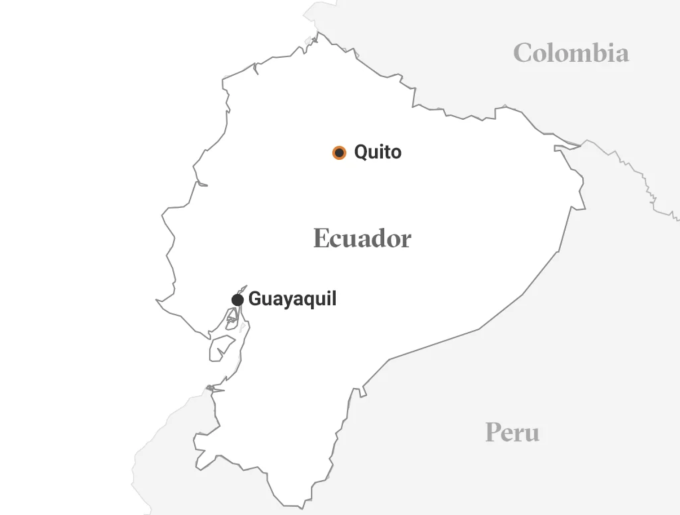
Location of Ecuador and the port city of Guayaquil. Graphic: OpenStreetMap
Drug traffickers have also sought to influence and dominate Ecuador’s government. The recent presidential election was overshadowed by the assassination of Fernando Villavicencio, a candidate who took a hard line against gangs and corruption. In 2023, at least seven Ecuadorian politicians were assassinated in connection with drug trafficking.
President Noboa is seeking to restore order to the country with his “Phoenix Plan,” which he announced in November 2023 shortly after his election. He advocates investing in the military and police to improve their crime-fighting capabilities, building more prisons with stricter surveillance systems, and strengthening security at ports and airports.
Noboa estimates the reform program could cost around $800 million, but he hopes to convince the United States to share the burden with $200 million in aid.
In addition, President Noboa is negotiating an agreement to deport criminals from neighboring countries. Colombians, Peruvians and Venezuelans make up about 90% of foreign prisoners in Ecuador, with more than 1,500 Colombians alone.
"Global drug trafficking organizations are increasingly hungry for drugs, while Colombia's output is at a record high. According to a United Nations investigation, about a third of Colombia's illegal coca cultivation is concentrated in an area just 10 kilometers from the Ecuadorian border," he said.
Thanh Danh (According to Conversation, Reuters, Crisis Group )
Source link







![[Photo] Prime Minister Pham Minh Chinh chairs conference on anti-smuggling, trade fraud, and counterfeit goods](https://vphoto.vietnam.vn/thumb/1200x675/vietnam/resource/IMAGE/2025/5/14/6cd67667e99e4248b7d4f587fd21e37c)

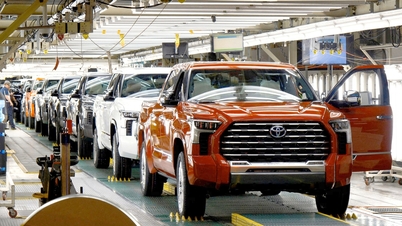



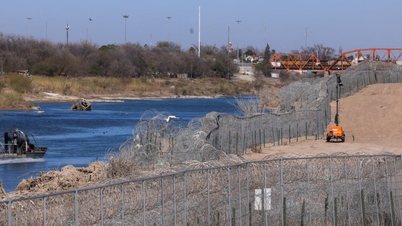
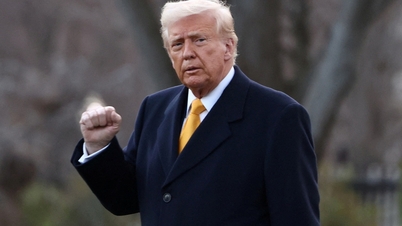
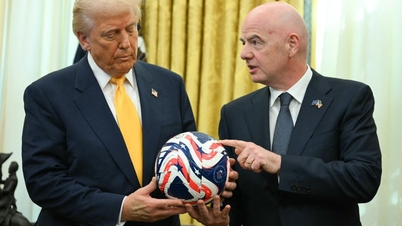
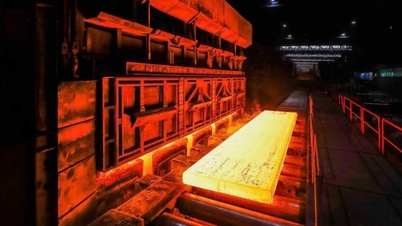



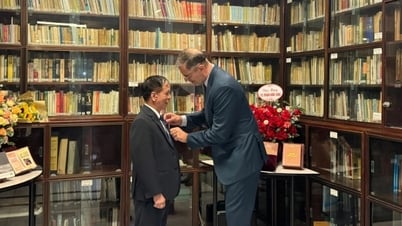
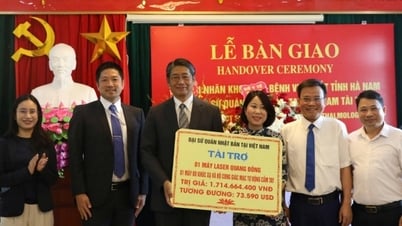
![[Infographics] Vietnam re-elected Chairman of the World Customs Organization's Standing Technical Committee](https://vphoto.vietnam.vn/thumb/402x226/vietnam/resource/IMAGE/2025/5/14/ae5e22967ce14621b808fd71d3308f63)
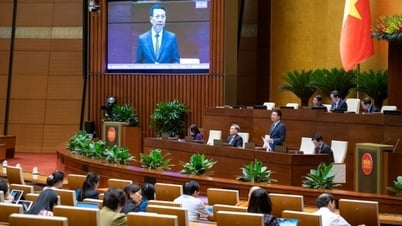
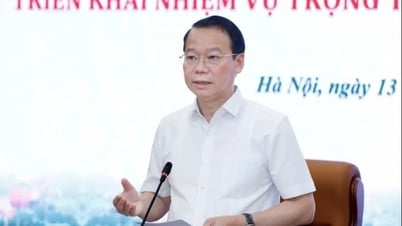













































































Comment (0)